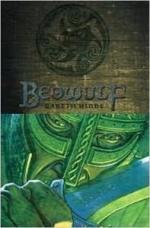{We will fight with nature’s weapons only.}
20 No battle-skill[1]
has he, that blows he should strike me,
To
shatter my shield, though sure he is mighty
[25] In strife and destruction; but struggling
by night we
Shall
do without edges, dare he to look for
Weaponless
warfare, and wise-mooded Father
25 The glory
apportion, God ever-holy,
{God may decide who shall conquer}
On
which hand soever to him seemeth proper.”
Then
the brave-mooded hero bent to his slumber,
The
pillow received the cheek of the noble;
{The Geatish warriors lie down.}
And
many a martial mere-thane attending
30 Sank
to his slumber. Seemed it unlikely
{They thought it very unlikely that they should ever see their homes again.}
That
ever thereafter any should hope to
Be
happy at home, hero-friends visit
Or
the lordly troop-castle where he lived from his childhood;
They
had heard how slaughter had snatched from the wine-hall,
35 Had recently
ravished, of the race of the Scyldings
{But God raised up a deliverer.}
Too
many by far. But the Lord to them granted
The
weaving of war-speed, to Wederish heroes
Aid
and comfort, that every opponent
By
one man’s war-might they worsted and vanquished,
{God rules the world.}
40 By the
might of himself; the truth is established
That
God Almighty hath governed for ages
Kindreds
and nations. A night very lurid
{Grendel comes to Heorot.}
The
trav’ler-at-twilight came tramping and striding.
The
warriors were sleeping who should watch the horned-building,
{Only one warrior is awake.}
45 One only
excepted. ’Mid earthmen ’twas ’stablished,
Th’
implacable foeman was powerless to hurl them
To
the land of shadows, if the Lord were unwilling;
But
serving as warder, in terror to foemen,
He
angrily bided the issue of battle.[2]
[1] Gr. understood ‘godra’
as meaning ‘advantages in battle.’
This
rendering H.-So. rejects.
The latter takes the passage as meaning that
Grendel, though mighty and
formidable, has no skill in the art of war.
[2] B. in his masterly articles on Beowulf (P. and B. XII.) rejects the division usually made at this point, ‘Þa.’ (711), usually rendered ‘then,’ he translates ‘when,’ and connects its clause with the foregoing sentence. These changes he makes to reduce the number of ‘com’s’ as principal verbs. (Cf. 703, 711, 721.) With all deference to this acute scholar, I must say that it seems to me that the poet is exhausting his resources to bring out clearly the supreme event on which the whole subsequent action turns. First, he (Grendel) came in the wan night; second, he came from the moor; third, he came to the hall. Time, place from which, place to which, are all given.
[26]




